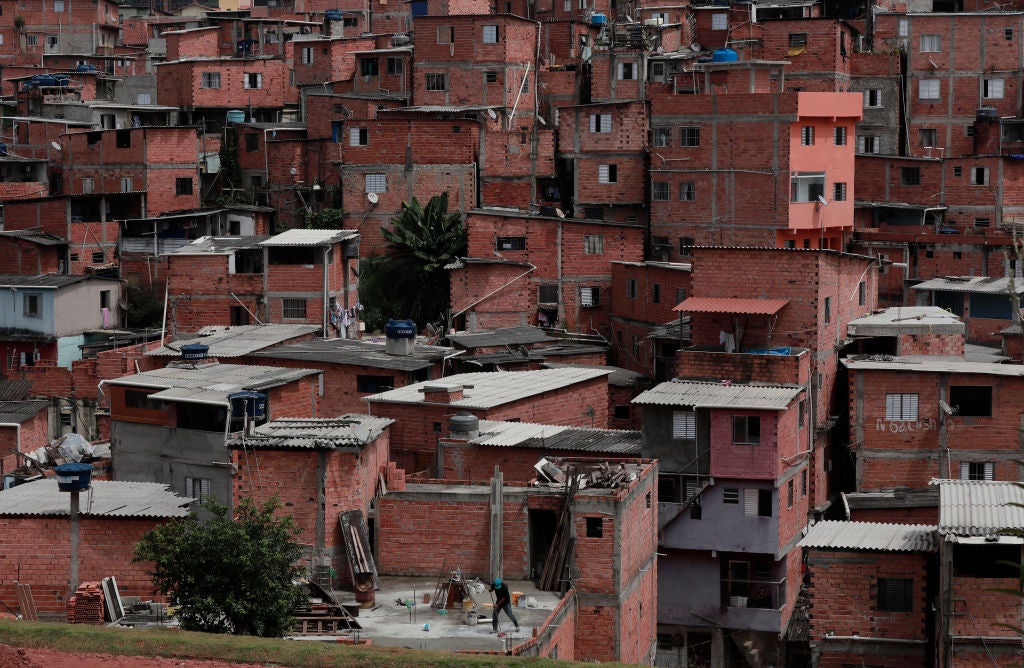In the favelas of Brazil coronavirus isn’t only a public health crisis – it’s a human rights crisis

Your support helps us to tell the story
From reproductive rights to climate change to Big Tech, The Independent is on the ground when the story is developing. Whether it's investigating the financials of Elon Musk's pro-Trump PAC or producing our latest documentary, 'The A Word', which shines a light on the American women fighting for reproductive rights, we know how important it is to parse out the facts from the messaging.
At such a critical moment in US history, we need reporters on the ground. Your donation allows us to keep sending journalists to speak to both sides of the story.
The Independent is trusted by Americans across the entire political spectrum. And unlike many other quality news outlets, we choose not to lock Americans out of our reporting and analysis with paywalls. We believe quality journalism should be available to everyone, paid for by those who can afford it.
Your support makes all the difference.Alongside 12 million others, I call São Paulo my home. When coronavirus hit, I knew our fight in the favelas would not only be for our health but our basic rights.
I have lived in this favela for 20 years. During that time, I have had to fight for my rights to an address, for services such as electricity, running water and garbage collection.
We fought to conquer our homes. Now, we must fight again for our rights in the face of this pandemic.
Brazil now has the third-highest coronavirus cases worldwide and during this pandemic, the social inequalities in the favelas are clear.
Data shows that those living São Paulo’s poorest districts are 10 times more likely to die of Covid-19 than in wealthier neighbourhoods.
A recent survey conducted by MDF, which included responses from over 1,300 favela residents, showed 21 per cent had experienced at least three coronavirus symptoms but only 4 people – 1.4 per cent of those with symptoms – had been tested.
Here, the coronavirus pandemic is not only a public health crisis. As the UN says, it has also become a human rights crisis.
Lack of access to dignified and safe housing mean that many poor people have no choice but to live in overcrowded housing far from basic services.
Many in the favelas have lost their jobs – our research found that the pandemic had a significant impact on the incomes of 90 per cent of people surveyed, while only 13 per cent had savings to help them through the crisis.
Additionally, a combination of misinformation and lack of joined-up government policy has led to a limited observance of social distancing by community members.
These factors have increased the risk of the virus spreading in poor areas of the city, which is having negative impacts in this already fragile context.
Over the years, while participating in the housing movement, we have learned to take care of everyone and our environment – our common home.
Together, with the Union of Housing Movements, we carry on fighting inequality through advocating for better public policies. But we know that emergency action is necessary now.
In coordination with local government, we at MDF began organising donations and distribution of food packages, hygiene kits, masks, and cleaning products while supporting people to access health and social protection services.
We have been training local volunteers to safely deliver food and hygiene kits throughout the favelas: supporting with distribution and providing logistical support to ensure it reaches families who need it most, especially those with young children.
But we are only a few, working with the poorest people across 40 favelas.
We rely on community leaders in the favelas to ensure that donations are done in a way that is safe and accessible to those who need them, while also following the World Health Organisation guidelines.
And, we are calling on the city government to reduce disease risk by providing street cleaning for the favelas, where this pandemic is just one of the challenges we must confront daily.
We built this community together. We will continue campaigning until everyone can look forward to a healthy future in a city that actually protects and nurtures them.
Josefa Vieira dos Santos is a community leader at Movement in Defence of Favela, which is supported by UK charity CAFOD





Join our commenting forum
Join thought-provoking conversations, follow other Independent readers and see their replies
Comments